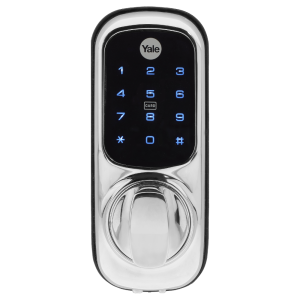Are Smart Locks Secure?
A traditional lock uses a physical key to manually activate it, and we have trusted this method for many, many years. Smart locks still require a ‘key’ to activate it, but this interactive element is very different and is in the form of smart technology, which is convenient and offers far more beneficial functionality. But ultimately, is a smart lock as secure as a traditional lock? In this guide we will look at both types of lock and assess the differences and how safe new smart technology really is.
What is a smart lock?
First of all we need to understand exactly what a smart lock is. Essentially it is a modern version of a traditional lock in that it still uses the same type of deadbolt design to physically lock the door, but the action of locking it is carried out by a digital signal or command sent by a smartphone app.
A smart lock is connected to your home WIFI network, which enables you to manage the functionality through your smartphone from any location. This is done by viewing the ‘lock’ status on your phone and managing it accordingly. There are various benefits to this use of smart technology, which aid practicality and convenience, but are smart locks necessarily safer?
How do smart locks improve security?
While we have trusted traditional locks for years, they have always presented certain vulnerabilities:
- They can be picked
- They can be damaged and removed from the door
- Physical keys can be lost, copied or stolen
- Because the action of locking/unlocking a door is manual, human error can lead to this being forgotten and a door/home being left unlocked unknowingly.
It is true that smart locks also present some vulnerabilities, but here we will look at these and address how these are outweighed by the added security benefits. So how do smart locks improve our home security?
- A smart lock system will be managed by an administrator, ie. the person in the household who has the smartphone app and can centrally control who has access and how the access system works.
- The system administrator can issue ‘digital keys’ to family members and other trusted people via their smartphones, and can also revoke this access in an instant, from anywhere in the world. So you won’t have multiple copies of a physical key hanging around the home.
- So access can be restricted and denied if there is a security breach, ie. if someone’s phone is stolen or it is suspected that unauthorised access has been allowed.
- Security can be enhanced by managing your WIFI network to avoid unauthorised encryption or ‘hacking’. So you can regularly update your software, regularly update your WIFI password, and also install a two-step verification process to further challenge anyone intent on bypassing your security system. You can also change the password on your smartphone app.
- You can set-up time-based durations for temporary access, for example if there is a trusted contractor coming round while you are out, or if you have a cleaner or a dog walker while you are at work. This also allows you to monitor who accessed the home and when, so that you can spot unusual trends.
- A smart lock can be set-up to issue notifications if the lock hasn’t been engaged for a certain length of time. In fact, you can set it to automatically lock in these circumstances, but you may not always want to do that if someone is actually in the house. So if you are at work and you receive a notification that the door has been left unlocked for, say, 20 minutes, you can lock it remotely via your smartphone. This means you never need to worry about forgetting to lock the door, trusting your teenage son to lock the door or if you lose your keys.
- A smart lock can also have a night-time mode, so that it will lock automatically at a certain time whether you are in the house or not.
- It is possible to retain the ability to use a physical key to activate a smart lock, for such instances where you have lost your phone, the battery has died or there is a technology issue.
- Smart locks can be integrated with other smart systems around the home, such as security cameras, doorbell cameras and alarm systems to provide a more robust and comprehensive security solution.
- While smart technology ‘can’ be hacked, this is an action that requires time and expertise. Most burglaries are opportunist and ‘in the moment’. Your home is unlikely to have been targeted by a gang of professional thieves who have masterminded the operation with weeks of preparation like a bank robbery, so if they encounter a smart lock, statistically, they are unlikely to have the knowledge, patience or time to ‘hack’ it. Certainly the chances of this happening are less likely than leaving your keys in the door when you busily return home or forgetting to lock it when you go out.
Contact MB Direct to talk about smart lock security
So smart locks do have elements of vulnerability, but these don’t carry the same level of risk as the vulnerabilities of a traditional lock, and the added features and functionality of a smart lock make them a far more robust security solution. Furthermore, smart technology is developing all the time and constantly evolving, to help combat attempts to bypass any in-built security systems.
It is important to remember that smart locks still use strengthened stainless steel deadbolts, just like traditional locks, and these are still certified and manufactured to specific safety standards, so the functionality of smart locks actually provides a wealth of security benefits. So check out our range of smart products at MB Direct and talk to our team today about the best smart security systems for you.